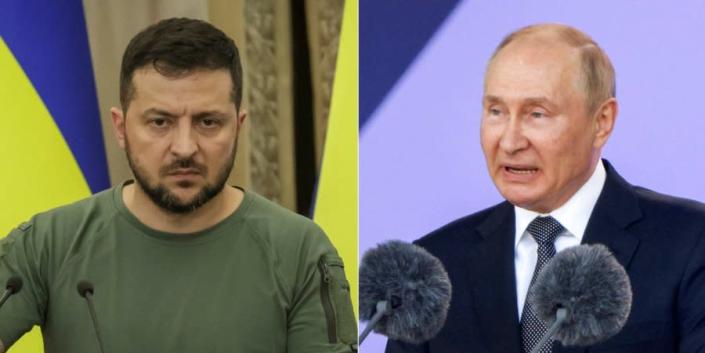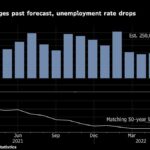
NV: Do you have any evidence to support the claim the Ukrainian POWs in Olenivka were burnt with napalm prior to the explosion?
Stupak: I’ll walk you through it. Initial Russian reports said Ukraine used HIMARS to annihilate its own troops. Absolute nonsense. Some photos started emerging afterwards, and I became concerned.
They depict the bodies of our soldiers. Some were still in their beds. Others were burnt to a crisp. Meaning that ostensibly it was an explosion, but bodies were burnt. Upon a closer look, I noticed that 95% of all beds at the facility remained in place. The roof had partially collapsed, while the windows were visibly charred.
So, was it an explosion or a fire?
An explosion would have thrown beds all across the building and collapsed some walls. That’s not the case. We can therefore conclude it was a fire.
I can’t say for certain what happened there. As I understand it, there’s a whole range of munitions that could have been used to create a localized fire, which would have left the bodies of our troops charred. It could have been white phosphorus or some kind of thermobaric munitions. Nevertheless, it clearly wasn’t an explosion caused by rocket artillery or a regular shell. It was a fire, deliberately started from the inside.
NV: Do you have a suggestion which Russian security services could conduct such an operation?
Stupak: As it stands, two Russian entities are directly responsible for Ukraine matters – the FSB and the Military Intelligence of Russian General Staff, formerly known as GRU. Those two are in constant competition with one another. Russian political intelligence (SVR) doesn’t work in occupied Ukrainian territories – their activity is overseas.
MI and FSB compete in bringing “good news” to Putin, vying for approval and a pat on the back. That’s their modus operandi ever since the Soviet era. By now, their competition is fever-pitch: delayed reports cause immediate suspicion and possible investigations. It goes far beyond healthy competition; it’s a matter of survival at this point.
That’s modern Russia for you. They are attempting the same approach in occupied areas of Ukraine, as well. A very strict counter-intelligence regime is in full force, especially in Kherson, as they are looking for guerrillas and partisans there. FBS is on the hunt for Ukrainian agents from SBU, military intelligence, police, and regular civilian activists.
NV: Recent reports in U.S. media said FSB expanded its ranks significantly prior to the invasion, with some operatives going as far as to arrange accommodation in Kyiv. How would you describe Russian security services’ preparations for the war?
Stupak: Their activity was on the rise, yes, and their ranks indeed did swell. Partially, though, it could be explained that any government structure in a dictatorship always seeks to expand its budgets, staff, and influence as much as possible. Every official seeks to oversee an ever-larger bureaucratic machine.
The FSB’s expansion was partially incentivized by the prospect of getting major promotions. A department of 30 people is a minor one, but if you can succeed in expanding it, suddenly you’re a general with a personal chauffeur. It’s a major self-aggrandizing move.
Nevertheless, significant preparations were made. It’s obvious by now that their agent network in Ukraine was flawed, ultimately supplying unreliable information to the Russian dictator. Reports were unconfirmed or partially falsified, and they convinced Putin that Ukraine would fall quickly. The SBU said that (Ukrainian MP Andriy) Derkach was supposed to assist in establishing a puppet government here.
“He’ll use his bodyguards; we have lists of people we need to detain. Done deal. In a week or two, a month at most, we’ll declare some sort of ‘people’s republic’ under the banner of Russia,” the Russian leadership thought.
NV: Speaking of Derkach – another Ukrainian MP Viktor Medvedchuk essentially had a private army, operating in the open for some time.
Stupak: That’s one example.
Crucially, all these people in Ukraine were doing it for money, as opposed to some sort of coherent ideology. Local collaborators were taking Russian money for some time, but they didn’t expect an actual invasion to take place. They were eagerly absorbing the flow of funds from Moscow, without doing any actual work. They expected it would last five or ten more years.
The situation in Ukraine was continuously destabilized, but the invasion revealed that nothing concrete was ready.
NV: In your estimation, how many Russian agents remain embedded in Ukrainian government structures?
Stupak: Some still remain, I think. It’s hard to say how many – in either relative or absolute figures. Some did it purely for money.
NV: “Hard times, perhaps I should sell out my country.”
Stupak: I’m sure some of them cut all ties with Moscow after the invasion, hoping to avoid detection.
NV: Do you think Putin would have attacked if he knew Ukraine would resist the way it did?
Stupak: I don’t want to come up with excuses for him. Hopefully, he’ll stand trial in the Hague.
NV: It’s not about excuses, I just want to understand how responsible were his Ukrainian agents for what he did.
Stupak: I’m not sure he would have invaded if he had known that Ukrainians would resist and the president wouldn’t flee the country. He did not expect some comedian to be able to withstand an onslaught from a KGB, FSB colonel, a seasoned agent. But Zelesnkyy has prevailed over Putin, to put it bluntly.
Putin did not expect regular people would be armed in the streets, ready to defend Kyiv. He was convinced it would be quick and easy. But it wasn’t.
Perhaps, he would have opted to continue with attempts to corrode and degrade the Ukrainian state from within, funding his cadre of Ukrainian politicians and pundits.
Read the original article on The New Voice of Ukraine




